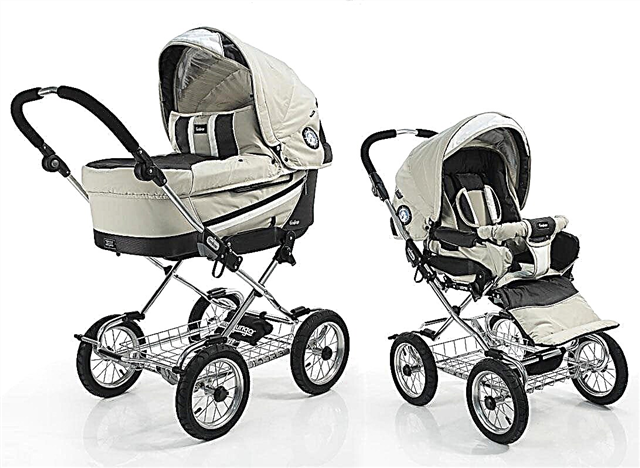Many mothers wonder when a baby stops spitting up. Regurgitation is the stomach's normal response to food ingestion. Rarely, spitting up indicates any pathology.

The child does not stop spitting up
What is regurgitation
This is an involuntary throwing of the contents of the stomach into the esophagus and mouth, spitting it out. Your toddler can throw away undigested food with varying intensity and quantity.
About 4/5 of all infants under the age of one year vomit daily. It is important to distinguish spitting up from vomiting. If the baby spits up, his abdominal muscles do not work. Breast milk mixture flows out of the mouth in a small stream. This phenomenon occurs after feeding, when the child's body position is changed.
With vomiting, the volume of excreted mass is much larger. Pay attention to pain and cramps in the stomach. Usually the child vomits with a fountain.
Important! In addition to food, bile may be released. Sweat appears before vomiting, breathing quickens. There are no such symptoms during regurgitation.
There is no need to worry about regurgitation when they occur no later than an hour after eating. The natural volume of discharge is no more than 2 tbsp.

Normal regurgitation
Why does the baby spit up
The infant may spit up for physiological and pathological reasons. Pediatricians identify the following natural causes of regurgitation:
- Unformed digestive system. Particularly often, the allocation of part of the food happens when the cardiac part of the stomach is not formed. In the first months of life, children have not yet developed the cardiac sphincter. When the baby stops spitting up, this indicates the normal functioning of the digestive system.
Important! Regurgitation is more common in premature babies. Their body has not yet fully formed, and the digestive system is not yet ready for heavy loads.
- Binge eating. Often, parents do not keep track of the amount of food until the time when the infant regurgitates.
- Imbalance between pharynx and intestinal peristalsis.
- Air bubbles entering the intestines. If the baby is not properly applied to the breast, or if there is intense sucking, some air enters the stomach with the food. Its accumulation leads to belching.
- Excessive gas formation. They can appear even after the baby stops spitting up.
- Unformed central nervous system.
There are such pathological factors for the allocation of portions of food and air after feeding:
- Damage to the nervous system during the prenatal period of development. If a child suffers from encephalopathy, then he may regurgitate with a fountain. The newborn is restless, does not sleep well.
- Hydrocephalus. The child cries, throws his head back and spits up frequently.

Hydrocephalus
- Impaired blood supply to the brain as a result of trauma during childbirth.
- Abnormal development of the stomach and intestines.
Note! Frequent regurgitation indicates the risk of diaphragmatic hernia, pyloric stenosis (narrowness of the opening between the stomach and duodenum).
- Some infectious pathologies. Regurgitation is possible with meningitis, hepatitis, and other diseases accompanied by nervous excitement.
- Lactose intolerance. If it is impossible to digest lactose, the child will spit up, and often.
- Some hereditary pathologies. The discharge of air or food particles occurs during phenylketonuria, adrenogenital syndrome.
When the baby stops spitting up
Parents often ask when the baby will stop spitting up. The baby usually does this in the first months from birth.
Breastfeeding
Most babies stop spitting up breast milk before they are four months old. By 6 months, this phenomenon disappears in almost all children.
Bottle-fed
Parents are often interested in how old bottle-fed babies spit up. These babies begin to digest food normally by about six months of age. If a child can regurgitate at 8-9 months, do not panic. This phenomenon may stop by the time the baby begins to sit and learns to walk.

Artificial feeding
When to go to the hospital
Parents need to urgently see a doctor if they have the following symptoms:
- Spitting up like a fountain. It indicates the presence of neurological problems or spasms in the digestive tract.
- Discharge of air or food later than an hour. This indicates the development of lazy stomach syndrome.
- Spitting up regardless of food intake.
- Restlessness and crying when taking out portions of food.
- Spitting up after eating or drinking a little.
- The child has no weight gain.
- Regurgitation occurs after the age of one year.
- The child, regardless of age, has signs of dehydration.
- There are abdominal pains.
Ways to prevent regurgitation
Pediatricians remind that there are no effective means, devices that can reduce the frequency of regurgitation. The use of drugs for excessive gas formation and colic improves the functioning of the digestive system.
Preventive measures to help reduce the likelihood of excreting small amounts of food include:
- After feeding, the baby needs to be kept upright for longer. This way he can release a lot of air. When the baby stops spitting up, you don't have to.
- The baby is fed only when he is hungry. Babies often do not feel full, so they overeat. During breastfeeding, the baby should have the nipple in the mouth along with the areola. You need to feed in a slightly raised position (the baby should not lie).
- For a short time, you need to reduce the amount of food that is given to the child at one time. This applies to breastfeeding and artificial feeding.
Important! Before you reduce the amount of food during one feeding, you should consult your doctor. He will determine how much food should be given at a time. It is necessary to focus on the rate of weight gain of the baby.
- The baby should be swaddled before bed. In this state, he is calm, his activity decreases. At the same time, the pressure on the gastric walls decreases.

Swaddling a baby
- You need to walk with your baby every day. Do massage and gymnastics at the slightest opportunity.
- Before going to bed, give the baby a dummy. Sucking motions stimulate bowel movements.
Spitting up in infants is normal. Parents don't need to panic about this. At the same time, observe carefully for symptoms of gastrointestinal or other illness. In any doubtful cases, you should consult a doctor.



